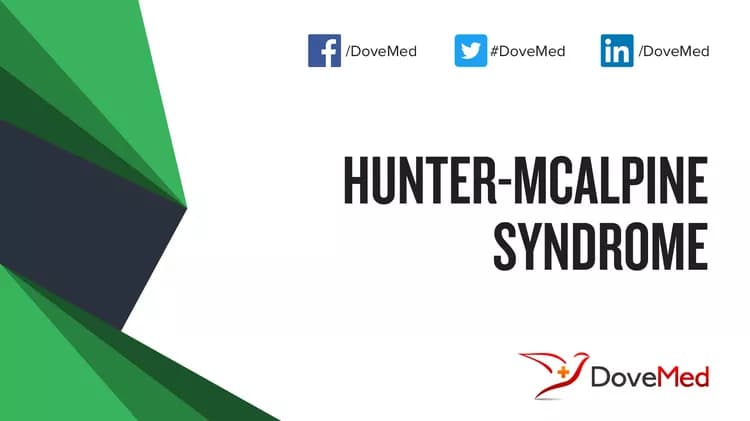What are the other Names for this Condition? (Also known as/Synonyms)
- Craniosynostosis, Mental Deficiency, Almond-Shaped Palpebral Fissures, Downturned Mouth, Mild Acral-Skeletal Anomalies, and Short Stature
- Hunter-Mcalpine Craniosynostosis Syndrome
What is Hunter-Mcalpine Syndrome? (Definition/Background Information)
- Hunter-McAlpine Syndrome is a very rare condition characterized by developmental delay, intellectual disability, and small head size (microcephaly)
- Sometimes the microcephaly results from early closure of the bones in the skull, which is called craniosynostosis. This can cause a misshapen skull and is common in individuals with Hunter-McAlpine Syndrome
- Hunter-McAlpine Syndrome is a genetic condition, meaning that it is caused by changes in the genes. It is typically diagnosed by genetic testing, and treatment options are focused on managing each individual’s symptoms
(Source: Hunter-Mcalpine Syndrome; Genetic and Rare Diseases Information Center (GARD) of National Center for Advancing Translational Sciences (NCATS), USA.)
Who gets Hunter-Mcalpine Syndrome? (Age and Sex Distribution)
- Hunter-Mcalpine Syndrome is a highly-infrequent congenital disorder. The condition has been described only in a few dozen individuals
- The presentation of symptoms may occur at birth
- Both males and females may be affected
- Worldwide, individuals of all racial and ethnic groups may be affected
What are the Risk Factors for Hunter-Mcalpine Syndrome? (Predisposing Factors)
- A positive family history may be an important risk factor, since Hunter-Mcalpine Syndrome can be inherited
- Currently, no other risk factors have been clearly identified for this condition
It is important to note that having a risk factor does not mean that one will get the condition. A risk factor increases one’s chances of getting a condition compared to an individual without the risk factors. Some risk factors are more important than others.
Also, not having a risk factor does not mean that an individual will not get the condition. It is always important to discuss the effect of risk factors with your healthcare provider.
What are the Causes of Hunter-Mcalpine Syndrome? (Etiology)
Hunter-McAlpine Syndrome may be caused in the following manner:
- A de novo duplication of genetic material in the long arm of chromosome 5
- Heritable changes passed from a parent with chromosome 5q duplication in which a subsequent chromosomal re-arrangement has led to a balanced translocation. If the chromosomal re-arrangement does not result in a net gain or loss of genetic material, it is known as a “balanced translocation”
- Those with balanced translocation of 5q can have abnormalities in the development of egg or sperm, resulting in Hunter-McAlpine Syndrome in the offspring
- The condition is inherited in an autosomal dominant manner
Autosomal dominant inheritance: Autosomal dominant conditions are traits or disorders that are present when only one copy of the mutation is inherited on a non-sex chromosome. In these types of conditions, the individual has one normal copy and one mutant copy of the gene. The abnormal gene dominates, masking the effects of the correctly function gene. If an individual has an autosomal dominant condition, the chance of passing the abnormal gene on to their offspring is 50%. Children, who do not inherit the abnormal gene, will not develop the condition or pass it on to their offspring.
What are the Signs and Symptoms of Hunter-Mcalpine Syndrome?
The signs and symptoms of Hunter-Mcalpine Syndrome may include:
- Almond-shaped palpebral fissure
- Craniosynostosis
- Almond-shaped eyes
- Drooping lower eyelids
- Downturned corners of mouth
- Intellectual disability
- Narrow mouth
- Short stature
- Developmental delay
- Abnormalities in fingers and toes
(Source: Hunter-Mcalpine Syndrome; Genetic and Rare Diseases Information Center (GARD) of National Center for Advancing Translational Sciences (NCATS), USA.)
How is Hunter-Mcalpine Syndrome Diagnosed?
Hunter-McAlpine syndrome is diagnosed on the basis of the following information:
- Complete physical examination
- Thorough medical history evaluation
- Assessment of signs and symptoms
- Laboratory tests
- Imaging studies
- Biopsy studies, if necessary
- Chromosome analysis of the cells from a developing fetus, if there is a family history of the disorder
Many clinical conditions may have similar signs and symptoms. Your healthcare provider may perform additional tests to rule out other clinical conditions to arrive at a definitive diagnosis.
What are the possible Complications of Hunter-Mcalpine Syndrome?
The complications of Hunter-Mcalpine Syndrome may include:
- Severe intellectual deficiency
- Decreased quality of life
- Dependence on others for day-to-day living
Complications may occur with or without treatment, and in some cases, due to treatment also.
How is Hunter-Mcalpine Syndrome Treated?
There is no cure for Hunter-McAlpine Syndrome, since it is a genetic condition. The treatment is usually given to manage the signs and symptoms and any complication that develops.
How can Hunter-Mcalpine Syndrome be Prevented?
Currently, Hunter-Mcalpine Syndrome may not be preventable, since it is a genetic disorder.
- Chromosomal analysis of a developing fetus (molecular testing of the fetus during pregnancy) may help in understanding the risks better during pregnancy
- If there is a family history of the condition, then genetic counseling will help assess risks, before planning for a child
- Active research is currently being performed to explore the possibilities for treatment and prevention of inherited and acquired genetic disorders
Regular medical screening at periodic intervals with tests and physical examinations are recommended.
What is the Prognosis of Hunter-Mcalpine Syndrome? (Outcomes/Resolutions)
- The prognosis of Hunter-Mcalpine Syndrome is dependent upon the severity of the signs and symptoms and associated complications, if any
- Owing to the limited number of affected individuals in medical literature, the long-term outcome for this disorder is not clear
- The prognosis may be assessed on a case-by-case basis
Additional and Relevant Useful Information for Hunter-Mcalpine Syndrome:
The following DoveMed website link is a useful resource for additional information:
Related Articles
Test Your Knowledge
Asked by users
Related Centers
Related Specialties
Related Physicians
Related Procedures
Related Resources
Join DoveHubs
and connect with fellow professionals


0 Comments
Please log in to post a comment.